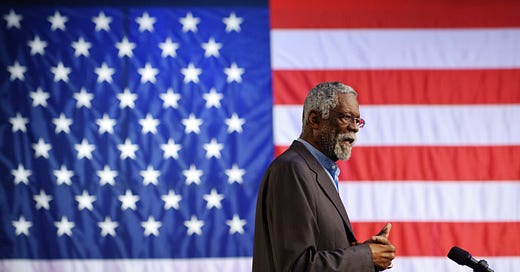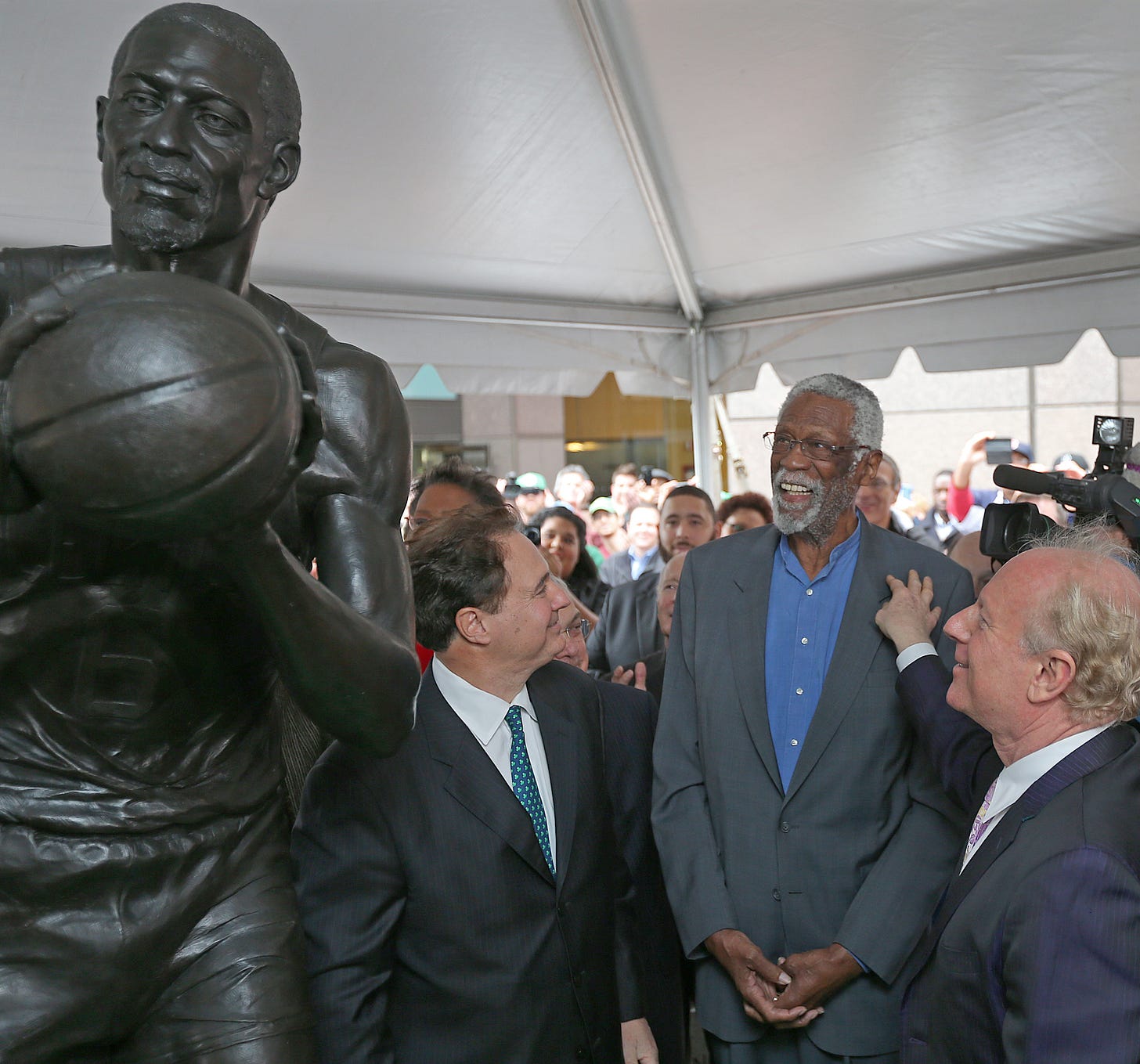Bill Russell Couldn’t Keep His Politics Out of Your Sports
The late NBA superstar didn't care if his civil rights activism made his fans uncomfortable, which is why he's a hero today.
Subscribe here to Calling Balls and Strikes!
Bill Russell, the Boston Celtics legend who died at 88 this weekend, is one of very few 20th century entertainers who can also legitimately be described as a hero and worthy of remembrance throughout history.
If you’re not a sports fan, here’s the short version: Russell won 11 NBA championships as a player and a coach. He broke racial barriers, revolutionized the game, and (before Michael Jordan or Lebron James entered the argument) was widely considered the runaway best player in NBA history. (Even now, he’s still solidly ensconced in the Top 5, at a minimum.)
Just on his merits as a paradigm-shifting athlete and entertainer, Russell deserves the Page One obituary treatment. But what earned him the Presidential Medal of Freedom was his commitment to political activism while he was still playing, at the height of his celebrity and cultural influence.
The “shut up and dribble” caucus of 2022 insist an athlete’s role is to showcase their talents, entertain the masses, enjoy their exorbitant salary, and otherwise stand for nothing. What they are not supposed to do is use their celebrity to advocate for political causes, much less revolutionary change. You’re just a “spoiled child” if you’re an athlete protesting racism today, in the eyes of self-described America-loving patriots.
Russell played before free agency reached the NBA and, therefore, was paid only what he could negotiate with the team’s owner—and not what he was actually worth in a free market. And yet, even with an annual salary that was less than 20 percent of what Lebron James makes per game, Russell marched with Martin Luther King. And he backed Muhammad Ali when he refused to be drafted into the Army during the Vietnam War. And shortly after civil rights activist Medgar Evers was assassinated by a white supremacist in Mississippi, Russell went to that heavily segregated state to open an integrated basketball camp.
That’s not just political activism, that’s political agitation. As the “my country, right or wrong” patriots would say: “He rubbed our faces in it.”
He was, in the parlance of the times, a “loud race man”—just as Ali was, and Kareem Abdul-Jabaar, and before them—Jackie Robinson.
Russell regularly endured despicable racist taunts from his own Boston fans. Bill’s daughter, Karen Russell, recalled in a 1987 New York Times Magazine essay:
“Our house was in a shambles and ‘NIGGA’ was spray-painted on the walls…The burglars had poured beer on the pool table and ripped up the felt. They had broken into my father’s trophy case and smashed most of the trophies…
I was petrified and shocked at the mess; everyone was very upset. The police came, and after a while, they left. It was then that my parents pulled back their bedcovers to discover that the burglars had defecated in their bed.”
This is a helpful example for why nostalgia for the “good old days” before politics supposedly ruined sports is both historically ignorant and lacking in a basic understanding of how shit works.
Civil rights weren’t won thanks to a mass awakening of white racists, they were won by raising awareness through relentless protest. Minds were changed through education, shame, and political battles that led to the changing of laws. The civil rights movement was effective, in large part, for never letting the issue rest. Ever. Not even on the field of sport.
And the star athletes who lent their voices to the cause did so at considerable risk to their lives, families, and bank accounts. They would not be the “model minorities,” and they made it clear to their conflicted white fans that it was on them to catch up with the times, and recognize that sitting on their hands amidst such injustice was tacit approval.
It is also worth recalling that this era of horrific injustice was barely a few generations ago. Russell, who died at 88, lived in the Deep South when lynchings were still common. He was a teenager when the military was finally desegregated, and he reached adulthood well before interracial marriage was legalized throughout the U.S.
There are people still alive who lived during a truly shameful period of American history. This isn’t the Civil War, this is barely the past.
It makes me wonder: If it weren’t summer vacation, could a teacher in one of the dozens of states with a ban on “critical race theory” in schools even talk to their students about Bill Russell?
These bills (many of which are now law) frequently go well beyond CRT, placing prohibitions on the teaching of “divisive topics”—which could literally be anything—as well as discussions that surmise America might have some troubling aspects of its history that make students and parents “uncomfortable” to hear.
So how does a teacher talk to their 7th grade history class about Bill Russell? Would it go something like this?
“Bill Russell was a great basketball player. He marched with MLK. Yes, that’s right, the guy we celebrate with a day off in January. No, I can’t get into why we celebrate either of them. It’s divisive. Now, let’s move on. In 1492, Columbus sailed the ocean blue…”
Sports are culture, and culture is politics. There is no disentangling the two.
Many people on the right—despite having a 6-3 right-wing Supreme Court majority radically remaking the country in its image—feel besieged in the culture wars.
They see two gay characters having a one-second kiss in a Disney movie as grooming and indoctrination. They practically fainted over MLB moving the All-Star Game out of Atlanta in 2021. And they lament Star Trek engaging in progressive social politics, as if the franchise hasn’t been doing that for nearly 60 years. (The actress Nichelle Nichols, who also died this weekend at 89, played Lt. Uhura in the original series and films, and notably shared one of the first on-screen interracial kisses in 1968 with William Shatner’s Capt. Kirk.)
To the anti-snowflake crowd that needs to be shielded from “divisive topics,” all of this is intrusive politics—worse, activism—sticking its uppity nose where it doesn’t belong.
But sports and culture have always been political. Always. Politics isn’t just horse race campaigning and Capitol Hill machinations. Politics is the world in which you live.
Consider still another event this weekend—where former President Donald Trump hosted the newly launched, Saudi-owned LIV Golf tour at his Bedminster Golf Club.
When 9/11 families demanded to know how the flag-humping, coup-attempting “patriotic” ex-president could help whitewash the Saudi royal family’s many crimes—which include backing the 9/11 hijackers—Trump literally engaged in 9/11 trutherism.
“Nobody’s gotten to the bottom of 9/11, unfortunately,” lied the former president, trying his best to keep those pesky politics out of his sports.
Russell’s death also reignites the debate over whether the activism of star athletes today deserves to be considered alongside the battles which Russell and his cohort fought.
In the past, the knee-jerk anti-woke brigades argue, there were legitimate reasons to protest. Racism was real, but it’s all past tense now and, therefore, everyone should just get over it. Today’s athletes, on the other hand, are spoiled prima donnas who should be appreciative of everything America has “given” them, and keep quiet about racism, police brutality, climate change, LGBTQ rights, etc, so the thinking goes. (Personally, I don’t think they should be directly compared—Lebron James’ hypocrisy on human rights issues is well-documented, and Colin Kaepernick’s praise of Fidel Castro leaves a bad taste. I could go on, but that’s another column.)
Perhaps there’s one guy whose opinion on the topic is worth considering: Bill Russell’s.


Russell in 2017 posted a photo in which he’s “taking a knee” in solidarity with Kaepernick and other NFL players who silently protested during pre-game performances of the national anthem. In 2020, Russell reposted the photo, this time with the caption:
“#Trump you projected your narrative that #TakingAKnee is disrespectful & #UnAmerican it was never about that! You are divisive & a coward.”
Russell brought his politics to sports, just as Trump does. I know who I’d rather have on my team.
(Subscribe here to Calling Balls and Strikes because I will never keep politics out of my sports and culture takes, and because in most other aspects of my life, I’d rather talk about anything but politics!)





